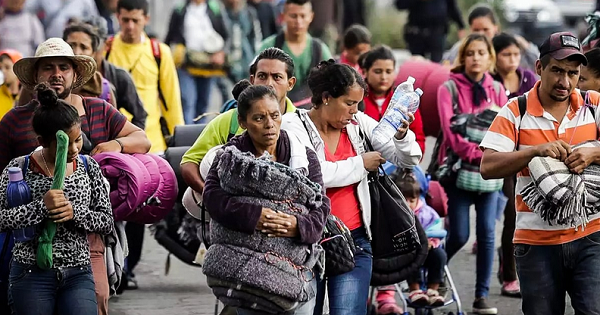Canada must strengthen its border, can’t absorb influx of migrants fleeing Trump’s deportation pledge, for top aide says
Canada needs to significantly strengthen its border, says a former chief of staff to Foreign Affairs Minister Mélanie Joly, because it can’t absorb large numbers of migrants who could flee here to evade U.S. president-elect Donald Trump’s pledge of mass deportations.
Peter Wilkinson, who recently spent 21 months as Ms. Joly’s top lieutenant and previously served as chief of staff to former Ontario premier Dalton McGuinty, said Canadians should be deeply concerned about Mr. Trump’s plan to deport up to 11 million undocumented migrants after he takes office in January.
While Mr. Trump has vowed to impose 25-per-cent tariffs on Canada and Mexico in a bid to stop illegal crossings and the flow of fentanyl into the U.S., Mr. Wilkinson worries about the threat of mass deportations.
“We just can’t take 11 million people. We can’t even take one million people or 500,000 people,” he said in an interview. “We have to stop people from coming in. We will be faced with something that as Canadians, that we never really faced before.”
Mr. Wilkinson said the country’s health care and social-welfare systems can’t handle potentially huge numbers of people crossing into Canada. While many groups will argue that this country should accept these migrants, he warned that this issue could fracture the Canadian consensus on immigration.
“Lots of groups in society will be saying ‘no, we can’t do that, it is inhumane,’ and I understand that,” he said. “We are straining a bit now on the consensus in the country in regard to immigration and refugees. This will blow it up.”
After a meeting between Prime Minister Justin Trudeau and provincial premiers and territorial leaders Wednesday evening, Deputy Minister Chrystia Freeland promised more dollars to prepare the border for the Trump presidency.
Mr. Wilkinson, who left Global Affairs in October, sat down for an interview to discuss the job of a chief of staff at the department of foreign affairs.
“It’s 24/7 and almost always there is something going wrong in the world and one way or another it affects Canada and usually not in a good way,” he said.
He cited the Ukrainian-Russia war, India’s alleged killing of Canadian Sikh leader Hardeep Singh Nijjar and Israel’s onslaught in Gaza in the aftermath of the Oct. 7, 2023, rampage by Hamas as issues that took up much of the time of Ms. Joly during his tenure.
Mr. Wilkinson said the Trudeau government struggled to develop an even-handed response to what was unfolding in Gaza, an issue that has divided Canadian Jews and Arabs, including MPs in the Liberal caucus.
“It wasn’t a foreign affairs issue. It was very much a domestic issue,” he said.
Ms. Joly also kept in regular backchannel contact with Indian External Affairs Minister Subrahmanyam Jaishankar even as relations went into the deep freeze after the Prime Minister accused Indian agents of being behind the plot to kill Mr. Nijjar in June, 2023. Relations were frayed even more this October after the RCMP said India has plotted widespread violence, leading Canada to expel six Indian diplomats, including High Commissioner Sanjay Kumar Verma.
“She and Jaishankar kept talking so there was always a line of communication between the two countries,” he said. “They don’t like what happened to them and they don’t like that we talked about it. But you can’t have what happened and just sort of say, ‘well, we’ll be quiet about it.’ You can’t in any way shape or form.”
The Globe recently reported, citing a senior national-security official, that Canadian security agencies believe Mr. Jaishankar and Indian Prime Minister Narendra Modi’s trusted national-security adviser Ajit Doval were aware of India’s activities in Canada, which were allegedly directed by Home Affairs Minister Amit Shah. Mr. Trudeau’s national-security and intelligence adviser, Nathalie Drouin, responded to the report, saying Ottawa has no evidence directly linking Mr. Modi, Mr. Jaishankar and Mr. Doval to “serious criminal activity within Canada.”
Mr. Wilkinson said implementing Ottawa’s Indo-Pacific strategy and developing a new policy for the Arctic were also focuses of his time at Foreign Affairs. The Arctic strategy, which will promise a greater presence in the High North including new icebreakers, is expected to be unveiled before the end the year.
In recent years, Russia has reopened and modernized military bases while China has poured billions into polar exploration as melting Arctic sea ice offers new shipping routes.
“For many years we haven’t had to think about it as much as we should have because geography made it extremely inhospitable because no one was going up there,” Mr. Wilkinson said. “But climate change is fundamentally changing that so we have to assert our sovereignty. Simply put: if we don’t do it, someone else will.”
Mr. Wilkinson said he found his time in government exhilarating but stressful, particularly the toll the job takes on family. He drove home to Toronto every Friday afternoon and returned to Ottawa on Sundays.
“The people who really make the biggest sacrifices are the families,” he said.
What he’s found since he last served as Mr. McGuinty’s chief of staff in 2010 is how polarized the country has become, partly attributed to the meanness of social media.
“We question people’s motives now all the time. There must be an angle. We are really tough on people and therefore people don’t want to get involved. and I think that is stopping people from getting involved,” he said, referring to politics.
“My advice simply is that you have a very important job but do not take yourself too seriously. It’s going to be long hours. It is going to be stressful, so look for the humour in things and find opportunities to laugh.”
This article was first reported by The Globe and Mail













